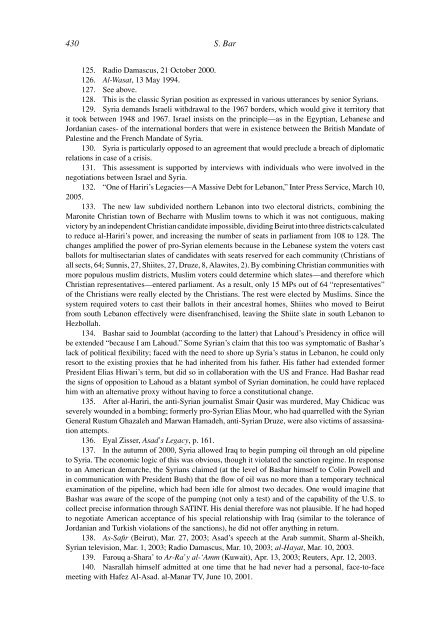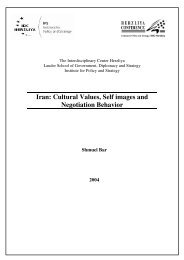Bashar’s <strong>Syria</strong> 429118. <strong>The</strong> Political Program speaks of the model of the “Medina Constitution” that was implementedby the Prophet in his Medina period, which enfranchised all residents of Medina notonly Muslims. Radical Muslims tend to dismiss this paradigm as one that derived from the periodof weakness of the Muslims <strong>and</strong> being superseded by the exclusivity of the Muslim Ummah. <strong>The</strong>document also refrains from the anti-Jewish rhetoric that characterizes Jordanian <strong>and</strong> Egyptian MuslimBrotherhood. See al-Ikhwan al-Muslimun, al-Mashrou’ al-siyasi li-Suriya Mustaqila—RawiyatJam’at al-Ikhwan al-Muslimin fi-Suriya (<strong>The</strong> Political, Program for an Independent <strong>Syria</strong>—Positionof the Association of the Muslim Brotherhood in <strong>Syria</strong>). <strong>The</strong> program received the backing of anumber of Salafi scholars, including Sheikh Yousuf al-Qaradawi. In a recent interview, Bayanouniis cautious on all these issues. He distances his movement from the Salafis, skirts the issue of theAlawites by saying that “as they say they are Muslims, we do not contest that” (alluding to a traditionthat if someone greets you as a Muslim, do not say that he is not one) <strong>and</strong> restricting his referenceto Israel to a statement that “Israel is occupying Palestinian <strong>and</strong> <strong>Syria</strong>n l<strong>and</strong>s <strong>and</strong> these should bereturned. It would be preferable to secure their return through peaceful <strong>and</strong> political means,” leavingopen the question of whether the occupied “Palestinian l<strong>and</strong>s” are the West Bank <strong>and</strong> Gaza or thewhole of Palestine. Mahan Abedin, “<strong>The</strong> Battle within <strong>Syria</strong>: An Interview with Muslim BrotherhoodLeader Ali Bayanouni,” Terrorism Monitor, vol. 3, issue 16 (August 11, 2005).119. One of the main figures in this movement is Mustafa Setmariam Nasar (Abu Mus’abal-Suri). He was originally a follower of Adnan Oqla of the Marwan Hadeed’s Fighting Vanguard,left that organization in 1981, went to fight in Afghanistan, then lived in Spain <strong>and</strong> the UK. His groupis credited with a series of terrorist attacks inside <strong>Syria</strong> <strong>and</strong> with aiding the mujahidin in Iraq in theircross-border operations.120. Amir Kulick, “Tefisat Hamaazan Haestrategi—Hashpaatam shel Tahalichei Shinui HistoriimAl ‘Itsuv Tfisat Habitahon Hasuri” (“<strong>The</strong> <strong>Strategic</strong> Parity Concept—<strong>The</strong> Influence of HistoricalProcesses on the Formation of the <strong>Syria</strong>n Security Perception”), MA thesis submitted to Tel AvivUniversity, October 2002.121. Some examples are: (1) Bashar’s blatantly anti-Semitic statement during the visit of thePope (June 5, 2001) that the Jews continue to threaten the world as they crucified Jesus. While hisfather made similar anti-Semitic statements in earlier years, he had learned to respect the fact that theywere counter productive to his relations with the U.S. <strong>and</strong> the West; (2) his reaction to the al-Haririassassination.122. For example: “We hear how they [the Israelis] kill the principle of equality even as theyspeak of Allah’s having separated them from the other nations of the world. We see them damagingthe Christian <strong>and</strong> Muslim holy places in Palestine. <strong>The</strong>y desecrate the mosque of Al-Aqsa, the Churchof the Sepulchre [Jerusalem] <strong>and</strong> the Church of the Nativity [Bethlehem]. <strong>The</strong>y attempt to destroyall the principles of the monotheistic religions for the same reasons they betrayed <strong>and</strong> tortured Jesus,<strong>and</strong> for the same reasons they tried to kill the prophet Mohammad” (Bashar Asad to the Pope onMay 5, 2001, reported by Radio Damascus). Other examples include Bashar’s speech at the Arabsummit: “Israeli society . . . is a racist society. More racist than the Nazis” (Tishrin (<strong>Syria</strong>), March 28,2001, translated in MEMRI Special Dispatche Series, no. 202), <strong>and</strong> reiteration of the veracity of theProtocols of the Elders of Zion.123. See Bashar’s speech before the Arab summit conference in Amman (27 March 2001):“<strong>The</strong>re are three things that Israel fears: . . . the close past in which they have been implementing apolicy of oppression even before 1948 . . . the past in general, history, they have no history, we havehistory <strong>and</strong> they know that . . . And the l<strong>and</strong> ...everyIsraeli know that the l<strong>and</strong> is not his but belongsto the Arabs.”124. As long as Israel exists, the threat exists . . . none of the Arabs trust Israel. It is naturalthat we should always expect an Israeli attack, even when it does not threaten. It should be knownthat Israel is based on treachery ...Wearedealing with treachery <strong>and</strong> threats, which accompanied theestablishment of Israel. Since <strong>its</strong> very inception, Israel has been a threat. It is the Israeli nature, <strong>and</strong>for that Israel was established . . . Israel does not care about the international public opinion. <strong>The</strong> U.S.is unable to reign it in; to the contrary, the Israelis are the ones who control [the U.S.] now throughtheir lobby.” Bashar to al-Safir, 27 March 2003. MEMRI Special Dispatch Series, no. 488.
430 S. <strong>Bar</strong>125. Radio Damascus, 21 October 2000.126. Al-Wasat, 13 May 1994.127. See above.128. This is the classic <strong>Syria</strong>n position as expressed in various utterances by senior <strong>Syria</strong>ns.129. <strong>Syria</strong> dem<strong>and</strong>s Israeli withdrawal to the 1967 borders, which would give it territory thatit took between 1948 <strong>and</strong> 1967. Israel insists on the principle—as in the Egyptian, Lebanese <strong>and</strong>Jordanian cases- of the international borders that were in existence between the British M<strong>and</strong>ate ofPalestine <strong>and</strong> the French M<strong>and</strong>ate of <strong>Syria</strong>.130. <strong>Syria</strong> is particularly opposed to an agreement that would preclude a breach of diplomaticrelations in case of a crisis.131. This assessment is supported by interviews with individuals who were involved in thenegotiations between Israel <strong>and</strong> <strong>Syria</strong>.132. “One of Hariri’s Legacies—A Massive Debt for Lebanon,” Inter Press Service, March 10,2005.133. <strong>The</strong> new law subdivided northern Lebanon into two electoral districts, combining theMaronite Christian town of Becharre with Muslim towns to which it was not contiguous, makingvictory by an independent Christian c<strong>and</strong>idate impossible, dividing Beirut into three districts calculatedto reduce al-Hariri’s power, <strong>and</strong> increasing the number of seats in parliament from 108 to 128. <strong>The</strong>changes amplified the power of pro-<strong>Syria</strong>n elements because in the Lebanese system the voters castballots for multisectarian slates of c<strong>and</strong>idates with seats reserved for each community (Christians ofall sects, 64; Sunnis, 27, Shiites, 27, Druze, 8, Alawites, 2). By combining Christian communities withmore populous muslim districts, Muslim voters could determine which slates—<strong>and</strong> therefore whichChristian representatives—entered parliament. As a result, only 15 MPs out of 64 “representatives”of the Christians were really elected by the Christians. <strong>The</strong> rest were elected by Muslims. Since thesystem required voters to cast their ballots in their ancestral homes, Shiites who moved to Beirutfrom south Lebanon effectively were disenfranchised, leaving the Shiite slate in south Lebanon toHezbollah.134. Bashar said to Joumblat (according to the latter) that Lahoud’s Presidency in office willbe extended “because I am Lahoud.” Some <strong>Syria</strong>n’s claim that this too was symptomatic of Bashar’slack of political flexibility; faced with the need to shore up <strong>Syria</strong>’s status in Lebanon, he could onlyresort to the existing proxies that he had inherited from his father. His father had extended formerPresident Elias Hiwari’s term, but did so in collaboration with the US <strong>and</strong> France. Had Bashar readthe signs of opposition to Lahoud as a blatant symbol of <strong>Syria</strong>n domination, he could have replacedhim with an alternative proxy without having to force a constitutional change.135. After al-Hariri, the anti-<strong>Syria</strong>n journalist Smair Qasir was murdered, May Chidicac wasseverely wounded in a bombing; formerly pro-<strong>Syria</strong>n Elias Mour, who had quarrelled with the <strong>Syria</strong>nGeneral Rustum Ghazaleh <strong>and</strong> Marwan Hamadeh, anti-<strong>Syria</strong>n Druze, were also victims of assassinationattempts.136. Eyal Zisser, Asad’s Legacy, p. 161.137. In the autumn of 2000, <strong>Syria</strong> allowed Iraq to begin pumping oil through an old pipelineto <strong>Syria</strong>. <strong>The</strong> economic logic of this was obvious, though it violated the sanction regime. In responseto an American demarche, the <strong>Syria</strong>ns claimed (at the level of Bashar himself to Colin Powell <strong>and</strong>in communication with President Bush) that the flow of oil was no more than a temporary technicalexamination of the pipeline, which had been idle for almost two decades. One would imagine thatBashar was aware of the scope of the pumping (not only a test) <strong>and</strong> of the capability of the U.S. tocollect precise information through SATINT. His denial therefore was not plausible. If he had hopedto negotiate American acceptance of his special relationship with Iraq (similar to the tolerance ofJordanian <strong>and</strong> Turkish violations of the sanctions), he did not offer anything in return.138. As-Safir (Beirut), Mar. 27, 2003; Asad’s speech at the Arab summit, Sharm al-Sheikh,<strong>Syria</strong>n television, Mar. 1, 2003; Radio Damascus, Mar. 10, 2003; al-Hayat, Mar. 10, 2003.139. Farouq a-Shara’ to Ar-Ra’y al-‘Amm (Kuwait), Apr. 13, 2003; Reuters, Apr. 12, 2003.140. Nasrallah himself admitted at one time that he had never had a personal, face-to-facemeeting with Hafez Al-Asad. al-Manar TV, June 10, 2001.
- Page 4 and 5:
Bashar’s Syria 355of political im
- Page 8 and 9:
Bashar’s Syria 359a-Zur province
- Page 11:
362 S. Barof Lebanon, with which Sy
- Page 17 and 18:
368 S. Barnaturally come with the s
- Page 19 and 20:
370 S. BarSimilar behavior on the p
- Page 21 and 22:
372 S. Bardemocracy” must be foun
- Page 23 and 24:
374 S. Barcultural, political and m
- Page 25 and 26:
376 S. Barexcept for those with fam
- Page 27 and 28: 378 S. Barthe provisions for nonpro
- Page 29 and 30: 380 S. Bar The ups and downs in rel
- Page 31 and 32: 382 S. Barfamily is also linked by
- Page 33 and 34: 384 S. Bar2. The “second generati
- Page 35 and 36: 386 S. BarThe reformist trend withi
- Page 37 and 38: 388 S. Barwould allow the younger g
- Page 39 and 40: 390 S. BarFigure 3. Heads of the Sy
- Page 41 and 42: 392 S. Bar Disruption of the “hie
- Page 43 and 44: 394 S. Bar(Majlis Milli), composed
- Page 45 and 46: 396 S. Bar Other prominent Syrians
- Page 47 and 48: 398 S. BarSyrian civil society—su
- Page 49 and 50: 400 S. BarMany of the Muslim Brothe
- Page 51 and 52: 402 S. BarThese elements find reson
- Page 53 and 54: 404 S. BarIran’s proxy, Hezbollah
- Page 55 and 56: 406 S. BarWest—and specifically t
- Page 57 and 58: 408 S. BarBashar is well aware that
- Page 59 and 60: 410 S. BarBashar did not read these
- Page 61 and 62: 412 S. Bartoken withdrawal while ma
- Page 63 and 64: 414 S. Barlegitimacy had eroded. Ne
- Page 65 and 66: 416 S. Barin the wake of the al-Har
- Page 67 and 68: 418 S. BarIt was Russia, however, t
- Page 69 and 70: 420 S. Baror so, with competitive p
- Page 71 and 72: 422 S. Bar10. According to the well
- Page 73 and 74: 424 S. Bar44. See Flynt Everett, In
- Page 75 and 76: 426 S. Barinternet news site, all4s
- Page 77: 428 S. Bar100. As one Sunni Syrian
- Page 81 and 82: 432 S. BarBengio, Ofra and Gabriel
- Page 83 and 84: 434 S. BarNews agencies and Newspap
- Page 85 and 86: Regional Command;Central CommitteeR
- Page 87 and 88: Main Figures in the Syrian Ba’th
- Page 89 and 90: Main Figures in the Syrian Ba’th
- Page 91 and 92: Main Figures in the Syrian Ba’th
- Page 93 and 94: Main Figures in the Syrian Ba’th
















